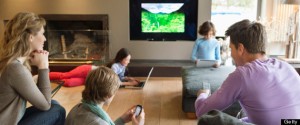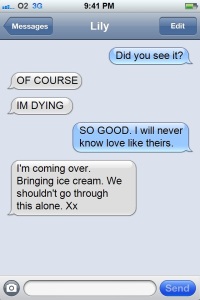Posts Tagged facebook
Everyone’s A Critic
Posted by roberto1810 in Films, Media, People, Publishing, Social Media, Television on January 10, 2014
Becoming a media journalist or culture critic is very, very difficult. It’s an incredibly competitive field that any number of degrees and qualification often doesn’t prepare you for, and it’s only getting harder. The graduate job market is saturated, with statistics showing that one in ten people with an undergraduate degree is unemployed, so apply those statistics to an already competitive industry and the reality strikes fear into the hearts of many a student (including myself.)
However, far and away the biggest threat to the budding critic is blogging and social media. Now clearly, for a budding writer, a blog presents an unmatched chance to showcase their writing and build up a portfolio, and with the right connections, tags, shares etc, can often attract the attention of relevant people and lead to some incredibly helpful connections. It is inarguable that ‘the best way to find a job is through networking‘; however, by the same token, the question remains that if seemingly everyone under the sun is blogging, tweeting, statusing, a range of reviews, discussions, analyses, how is it possible to stand out? More crucially, where is the line drawn between ‘respectable’ or ‘notable’ reviewers and someone sitting in bed at 3am writing a weakly crafted response to the latest episode of American Horror Story or their opinion on the BAFTA nominations?
If, like me, you follow a mix of personal and professional links on Twitter, when skimming it is often difficult to decipher which opinion comes from which outlet; is this tweet essaying American Hustle as a shoo-in at the Oscars from Total Film or that guy you met at that party once? The evidence of audience power is all around: popular reviews aggregator Rotten Tomatoes places audience reviews next to and the same size as critical reviews, thereby giving it equal prominence, and IMDb’s rating system is based purely on user reviews. Now this isn’t necessarily a bad thing, giving audiences the influence they arguably deserve as the people footing the bill, but the question remains: when everyone is talking, how do you decide who’s worth listening to?
Obviously, the barrier still remains between ‘trusted’ publications like Total Film and Empire, but the gap is closing fast. The definition of a journalist has also been updated and adapted to include a relationship with the public that wasn’t previously there, and beyond that it is now more than possible for Joe Everyman to respond to the critics’ opinions directly, whether to agree or disagree. The power is shifting to include the general population as a decision-making force to be reckoned with, but that in itself poses a problem: if everyone’s suddenly a critic, no one is.
Screen Exposure: Advantageous or Abhorrent?
Posted by roberto1810 in Media, People, Social Media, Technology, Television on January 8, 2014
It doesn’t matter if you approve or don’t, screens are now inextricably woven into the fabric of everyday life, and they’re here to stay.
It happened the other night. We (a group of four students) settled in to watch a TV show together, the final of I’m A Celebrity… (no judgement please). Halfway through the show I looked at the room, which had gone silent beyond the odd chuckle. I quickly realised why; between the four of us we were simultaneously using four smartphones, two laptops and two tablets, whilst ‘watching TV and chilling with friends’, which of course would’ve been the official party line had anyone asked what we were doing. It was in that moment I truly realised how digitised my generation has become; I can genuinely only think of two situations in which I am not constantly dipping in and out of various apps on my iPhone: 1) when I’m driving and 2) when I’m asleep.
This isn’t even exclusive to our particularly digitised demographic (i.e. young adults); in 2012 Google produced a study stating that 90% of the population’s media consumption was now screen-based, and beyond that, multi-tasking was reaching its pinnacle… 77% of the time we spend watching television was also spent using another device, such as a tablet or smartphone. A mere six months later, this infographic showed that those figures had risen again. The tide hadn’t so much turned as unleashed a tsunami upon the coast of the first world.
As with any new cultural trend, a discussion immediately erupted; for every person essaying the positives of this shiny, new digital world, there were naysayers concerned about the potential longer term developmental issues. However, the fact of the matter is that arguments about how good or bad this new global addiction is are somewhat irrelevant now, it functions simply as a habit nowadays. It is no longer a case of discussing the potential positives (greater ease of communication, increased cross-platform media engagement) or negatives (falsity of online relationships, decreased attention span, lack of ‘in-the-moment’ enjoyment), that proverbial ship sailed long ago.

Image Credit: http://www.huffingtonpost.ca/2013/06/10/tv-viewing-habits-canada-rogers-survey_n_3415721.html
Like it or not, it is now just another facet of everyday life, bringing with it a new vernacular of words and activities that even within my short 22-year life span have been ascribed new meaning or created altogether (selfie, Instagram, tweeting, snapchatting, online booking, app, I could go on…) Whether the thought of spending 90% of your time attached to a screen fills you with joy or an Orwellian chill, it’s irrelevant because it’s already happened. The revolution was televised, but you might’ve missed it… You were probably playing Temple Run.
The Death of The Watercooler Moment
Posted by roberto1810 in People, Social Media, Technology, Television on January 6, 2014
Nearly ten years ago, two lines of script became part of a shared vernacular for TV fans the world over. Before May 6th, 2004, you could say these sentences and no one would have given you a second glance; after that date, the words became synonymous with true love everlasting, eliciting sighs and squeaks of sentimental warmth from anyone you said them to. Soon after that, you could only get half way through the first line before everyone in the room joined in with you in a moment of joyful nostalgia…
‘No, NO. Did she get off the plane? Did she get off the plane?!’
‘I got off the plane.’
Yes, the final ever episode of beloved US sitcom Friends (spoiler alert, although if you need that I’m going to have to assume you’ve been living under a rock for several years) featured the denouement of the decade-long romantic arc between everyone’s favourite on again/off again TVcouple, Ross Geller (David Schwimmer) and Rachel Green (Jennifer Aniston)… And it was a beautiful moment. Perfectly pitched, completely surprising, gorgeously emotive without being saccharine or cloying, it had fans blubbing into their giant coffee cups and got everyone talking. No one could wait until the next day at work to discuss the events, to deconstruct what had happened to the six best friends we had taken into our homes on a weekly basis for ten long years.
But we had to; it was 2004… Doesn’t seem all that long ago, but there was no Facebook, no Twitter, not even everybody had a phone (lovingly called ‘mobiles’) back then. I was 12 and the only way I could get in touch with my friends was via the landline, and only then if no one was using the dial-up internet. This left us with very few options, meaning the accepted method of discussion was to just see everyone and discuss it the next morning. Used commonly in the vernacular back then, the watercooler moment is now demonstrably a thing of the past. Picture Ross and Rachel’s reunion were it to happen in 2013:
In fact, we don’t have to imagine it… this post sets up Nick (Jake Johnson) and Jess (Zooey Deschanel) of New Girl infamy as the Ross and Rachel of the digital decade. The fact is it’s no longer necessary to discuss…. well, virtually anything, in person anymore. A communal space in which to chat about television, books, films etc, has evolved from the well-worn industrial carpet surrounding the water dispenser into a massive online forum in which to exchange ideas digitally. No one needs to hear your mouth speak the words when you’ve already tweeted, statused and snapchatted about it. So called ‘social’ media actually means that although your opinion reaches many more people than it used to, no real connection is ever actually formed from it. This concept is demonstrated perfectly in this video:
In the digital age, the space our thoughts inhabit is no longer real, at least not physically and as a result the reactionary process our brains undergo is changing. Suddenly, in the space of a decade, reciprocal conversation is becoming a thing of the past; everyone’s talking but no one’s listening.






Recent Comments